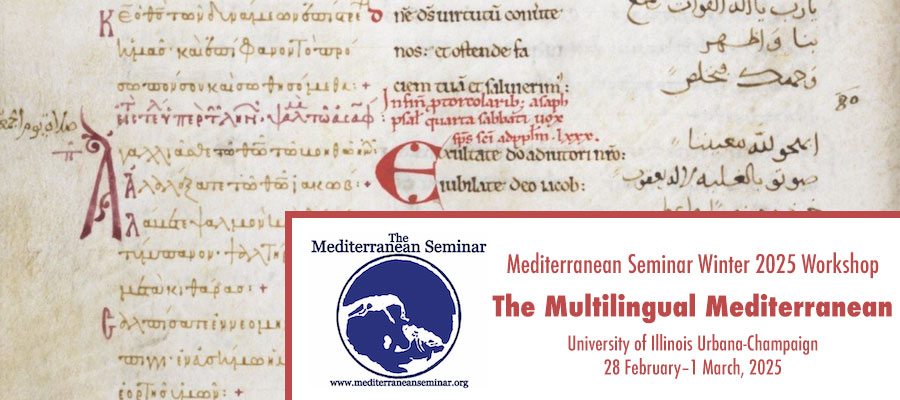The Multilingual Mediterranean, Mediterranean Seminar Winter 2025 Workshop, University of Illinois Urbana-Champaign, 28 February–1 March, 2025
The Mediterranean Seminar (www.mediterraneanseminar.org) is seeking proposals for papers to be workshopped and for round-table participants for the Mediterranean Seminar Spring 2025 Workshop to be held at the University of Illinois Urbana-Champaign on 28 February and 1 March on the topic, “The Multilingual Mediterranean.”
The Mediterranean is not only the crossroads between continents, cultures, peoples, and religions; it is also, as Suzanne Conklin Akbari and Karla Mallette have put it, “a sea of languages.” From the use of Romance rhyme words in the zajals of twelfth-century Iberia to the playful code-switching in twenty-first-century North African hip hop, writers and artists in the Mediterranean region have often mixed different languages to create new artistic forms, to provoke and perplex, and to test the borders of different identity categories. Multilingualism has also helped to forge networks of trade, diplomacy, exchange across the Mediterranean region, leading to the emergence of new koines, linguae francae, and pidgins. Indeed, we could say that multilingualism and different forms of multilingual creativity are constants of Mediterranean history, rather than sporadic exceptions to a monolingual norm or rule.
The workshop’s aim is to bring together scholars working on the history of multilingualism in the Mediterranean region. Our theme, “the multilingual Mediterranean,” encompasses such topics as language contact zones, multilingual art forms and media, and the relationships between language and identity. Our hope is to attract contributions from scholars working on several geographical contexts and historical periods in the Mediterranean world. We also hope to encourage contributions from a diverse range of disciplinary perspectives. To that end, we invite potential participants to consider our theme broadly, and even metaphorically, in order to engage with different forms of multilingualism—including the interplay and intersection of visual, musical, and material “languages” in the Mediterranean world.
The meeting will consist of three workshopped papers, a series of round tables, and two keynote speakers: Dwight Reynolds (UC Santa Barbara) and Will Stroebel (University of Michigan).
Proposals are welcome from scholars of all ranks from across all disciplines of the Humanities, Arts, and Social Sciences, as are papers from the Sciences, that engage in the broadest sense with social, historical and cultural aspects of the Mediterranean language, linguistics, literature, culture, society, art, and social, economic and political history, as well as anthropology, sociology, and other related humanities and social science disciplines. Graduate students, contingent faculty, scholars of underrepresented communities, and those whose work engages with historiographically marginalized groups are particularly encouraged to apply.
Papers may address either specific case studies or larger historical or historiographical dynamics and apparatuses. Comparative, interdisciplinary, and methodologically innovative papers are of particular interest. Our Mediterranean is construed geographically as including southern Europe, the Near East and North Africa and stretching into the Black Sea and Central Asia, and the Red Sea and the western Indian ocean. While our primary laboratory is the premodern Mediterranean, we welcome proposals from across historical eras, as well papers which focus on other regions in which analogous or related processes can be observed.
For the workshop to be held on February 28, we invite abstracts (<300 words) from scholars who would like to present an unpublished work-in-progress (articles and book or dissertation chapters) related to the theme of the multilingual Mediterranean.
For the round-table conversations, we invite abstracts (<300 words) for position papers.
